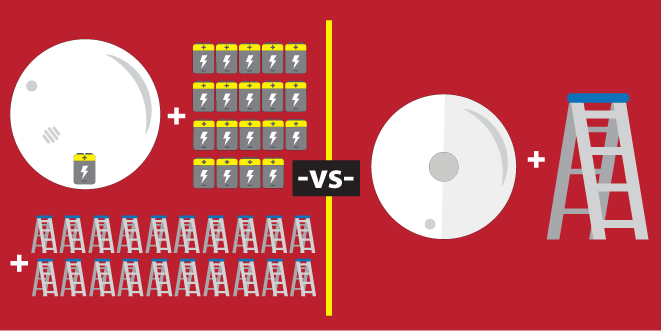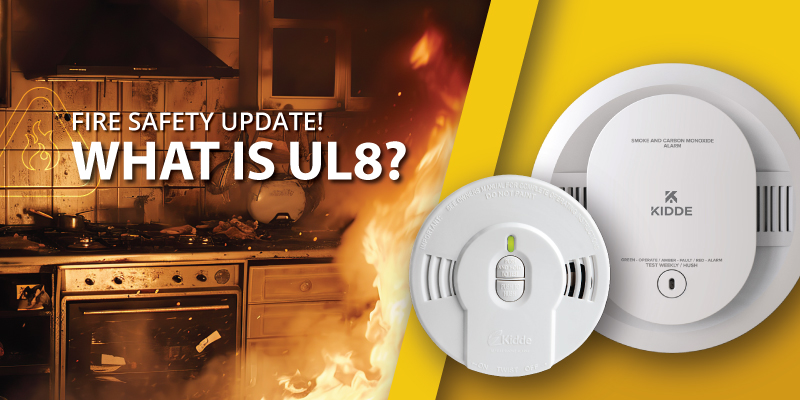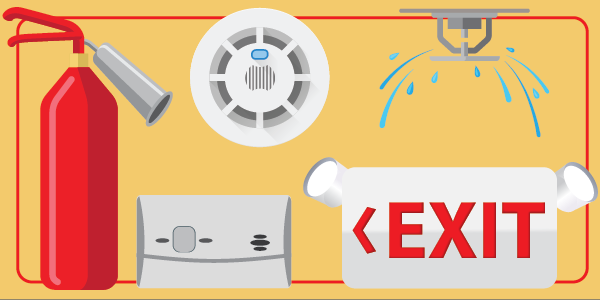Switching to 10 Year Smoke Alarms
Is It Worth the Initial Cost?
The potential risk of a fire damaging or even devastating a unit or several units on your property is a constant concern in multifamily. Statistically, the risk of a major fire is dramatically less now than it was several years ago. The importance of having working smoke detectors cannot be understated. They should be less than 10-years old and maintained throughout every unit on your property.
Why 10 Years?
It’s not just a question of how long a lithium battery will last or if the test button works. The sensor that should detect smoke or flame particles deteriorates over time. After 10 years, the sensor becomes unreliable and may not work properly in a fire, even if the test battery button is still working. This is why all alarms no matter the battery type, should be replaced after 10 years.
One way to remember to check your smoke alarms is to associate this task with the bi-annual time change. If your property uses the older style 9-volt smoke alarms, when it’s time to change the clocks, it’s also time to change the batteries in your smoke alarms. However, before investing new batteries, we want to challenge you to compare the time and expense of changing out batteries every six months to a one-time switch to a 10-year battery alarm.
Initial Cost
The out-of-pocket cost of new 10-year alarms is approximately 250% more than a standard 9-volt battery alarm. For many properties, that alone may make a 10-year battery alarm seem outside of the budget. It’s when you factor in lifetime maintenance costs of changing out batteries twice a year does a switch start to make sense.
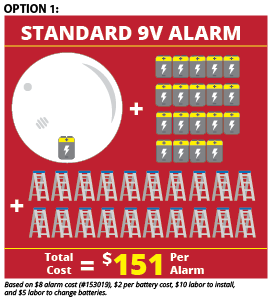
Option 1: 10-Years of Maintenance
In order to help ensure the alarm will work if/when it is needed, standard 9-volt alarms using alkaline batteries need to have their batteries changed every six months. Not doing so could be a liability.
There are two choices to facilitate changing of the batteries:
- First is to place the responsibility on residents to replace the batteries in their smoke detectors. You can supply the batteries and send reminders but there is no guarantee that the batteries will be changed.
- The second, and more reliable option, would be sending the maintenance team to replace batteries. This may take up a lot of your maintenance team’s time but, to be sure it gets done, this is probably your best bet.
Now consider the time it takes to bring a ladder to each unit and replace batteries. In the graphic we estimated $5 per alarm, assuming that the entire unit’s alarms would be changed at one time and that the entire building would be completed at that time. Now consider that labor cost two times a year, every year for the 10-year life of the alarm—for each alarm. The labor total can add up quickly.
The cost of batteries is the other factor. A standard alkaline 9V battery cost approximately $2 (based on current Chadwell Supply pricing). Changing out the batteries 19 times over the next 10 years will add up as well.
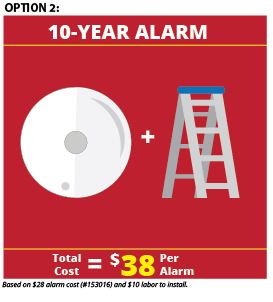
Option 2: Replace and Forget About It
If an alarm is replaced with a 10-year, sealed battery alarm, both the cost of batteries and labor are no longer a concern. There is only a one-time labor cost to install the new alarm. For the next 10 years, maintenance professionals are available to work on other tasks.
Calculate Your Savings
Our example resulted in a 10-year savings of $113 per alarm. This will easily pay for the increased cost of the 10-year battery alarms in less than 2 years. If you have 2 to 4 alarms in each apartment home, multiplied by the number of units on the property, you could see substantial savings. Example: For 150 units with three alarms in each, switching to worry-free sealed-battery alarms could save roughly $50,850 in labor and batteries over a 10-year period.
Other Considerations
There are always other factors than just cost. It would be remiss not to mention these other factors to consider when choosing a smoke alarm:
- Maintenance requests due to nuisance alarms from batteries that need to be replaced (inevitably this usually happens at 3 am or on the weekends).
- Using a sealed or locked battery unit helps ensure that the resident doesn’t take the battery out of the unit to quiet a false chirping, a real alert to something overcooked in the kitchen, or to use in another device.
- Jurisdictional mandates, such as state and local fire codes may soon require sealed battery alarms, if they do not already.
- The NFPA strongly recommends replacement of smoke detectors must be done at least every ten years.
Whether you decided to leave your property’s alarms status quo or make the switch, at Chadwell Supply we will be here to support you with batteries and alarms to help keep your property safe.
Note: Using 9V Lithium batteries made to have a 10-year service life in your standard alarms will work the same as having a 10-year battery unit. However, there is always the chance, if the alarm is not sealed or does not have a locked battery drawer, that the battery will mysteriously disappear…

